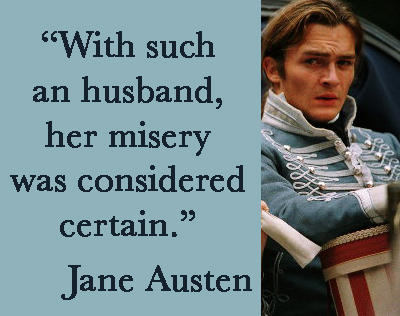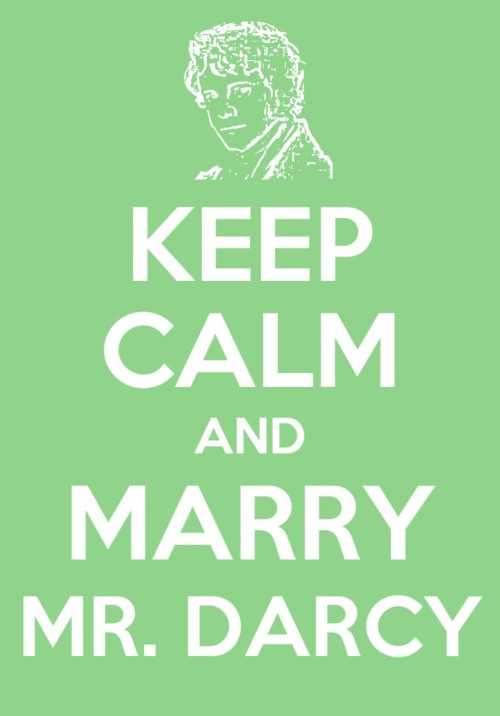Jane Austen is beloved by women everywhere, but her works are probably held most dearly by us frummies, since she presents a dating model we can understand completely.
 |
| Via Pemberly.com |
Income and background were ruthlessly dissected by parents of single children; the opposite sexes rarely had physical contact, the most being a limp handshake for .05 seconds, since longer was considered scandalous; courtships were rather short and usually under the watchful eye of a third-party chaperone, before a stiff proposal of marriage.
I had a thought the other day—Jane Austen has, in all her books, the villain masquerading as the nice guy, to whom the heroine is initially attracted; everything conveniently works out in the end, of course, when his nefariousness is revealed.
Sense & Sensibility: John Willoughby
Pride & Prejudice: George Wickham
Mansfield Park: Henry Crawford
Emma: Frank Churchill
Northanger Abbey: John Thorpe
Persuasion: William Elliot
But why does such a character exist in Austen's work to begin with? Her plots vary, even though they are all romances. Yet this wolf in sheep's clothing is a perennial player.
Perhaps because it was a valid concern. What did one know of the man who was wooing them, really? If a girl was an heiress, she could be pursued for her money (Georgiana Darcy); if she was poor, she had to make sure her suitor's intentions were honorable (as Lydia Bennet failed to do). It was just by happy chance that Darcy was willing to pay for the only possible solution to a destructive scandal in order rectify the reputation of his future wife's family.
 |
| Via austenquotes.com |
Since the dating state of affairs of circa 1800s are quite similar to our own, are we supposed to be more aware? In S&S, Eleanor warns Marianne that they know too little of Willoughby, and the signs that he was less than decent were blatantly present, prior to discovering his playing fast and loose with 15-year-old farm girls.
Marriage back then was usually permanent, despite the possibility of divorce provided by the Anglican church; once wed, there one stayed. Caution was vital.
 |
| Willoughby begs a lock of Marianne's hair |
But dissecting every casual statement that is uttered by a date isn't the best way either. After Hyde revealed himself, I was wracked by the terror of the "what if?" What if he hadn't dropped his mask so early on? Is it possible for a man to keep up that facade until the altar (in our case, chuppah)?
My upbringing was ingrained with paranoid fantasies as it is ("Lock the car doors, we're stopping by a light!") so it doesn't take much for me to think any unassuming fellow is Jack the Ripper.
 To trust, yet to tread carefully.
To trust, yet to tread carefully.

My head is starting to hurt.

2 comments:
Loved this post. My ex-Lit Professor would've been proud of this too. He always poked fun at us "Orthodox girls who are obsessed with Austen." Personally, I'm not the biggest Austen fan (shocker!), but I definitely agree with your statements here. There is a fine line between dating a guy who is really not great vs. someone is good but has flaws (just like the rest of us humans).
Logic vs. emotion/Sense vs. Sensibility can make dating so much trickier than it already is. Sigh. I'm personally struggling through this myself right now...that's why I wrote a whole megilah. Anyways, best of luck to the both of us! May Hashem be by our side and give us clarity.
"Pride & Prejudice" was fabulously written, but I'm not crazy about the rest of them. Edward in S&S was never fully developed.
That's what I worry about, like what you said, is he just human or is he a jerk? Clarity now!
Post a Comment